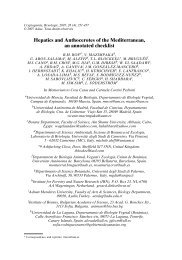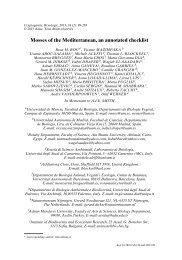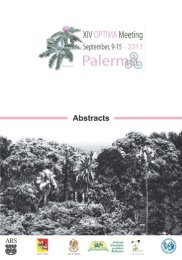Adil GÜNER, Vehbi ESER - optima
Adil GÜNER, Vehbi ESER - optima
Adil GÜNER, Vehbi ESER - optima
You also want an ePaper? Increase the reach of your titles
YUMPU automatically turns print PDFs into web optimized ePapers that Google loves.
GLOBAL CHANGE INFLUENCE ON DECORATIVE WOODY<br />
SPECIES OF MEDITERRANEAN FLORAL ELEMENTS<br />
�jur�a STOJI�I� 1 , Mirjana OCOKOLJI� 2 , and Dragica OBRATOV-PETKOVI� 2<br />
1 Scholarship holder of the Ministry of Science and Technological Development,<br />
Nemanjina 22-26, Belgrade 11000, SERBIA; djurdjastojicic@gmail.com,<br />
2 Faculty of Forestry, Kneza Višeslava 1, Belgrade 11030<br />
SERBIA; mirjana@Infosky.net, dragica.obratov-petkovic@sfb.rs<br />
Projections according to WHITE PAPER, Adapting to climate change: Towards a European<br />
framework for action, indicate that the increase of average global temperature and the<br />
concentration of carbon dioxide in the atmosphere will result in huge changes in the structure<br />
of the ecosystems and their functions. Further more there will be changes of ecological<br />
interactions and changes of geographical diameters with dominant negative consequences to<br />
biodiversity.<br />
Bearing in mind forthcoming changes as well as the fact that woody taxa exist in fixed<br />
environment conditions (among which climate factors are dominant) paper researches and<br />
analyzes presence and adaptability of decorative woody species of Mediterranean floral<br />
element in Belgrade urban coenosis within conditions of changed temperate continental<br />
climate. The researched group consists of 13 taxa with 383 individuals. Two species from<br />
subdivision Pinophyta and 11 from subdivision Magnoliophyta.<br />
The research has proved the increase of number of woody species of Mediterranean floral<br />
element on Belgrade green areas but also their adaptability to conditions of changed temperate<br />
continental climate. The analysis so far has reflected the urge of further researches in order to<br />
check the volume of acclimatization through the long term of studying and tracking of<br />
phenological changes which would provide the basics for creating bioclimatic maps.<br />
Keywords: dendroflora, biodiversity, global heating, climate change<br />
91<br />
27<br />
Posters






